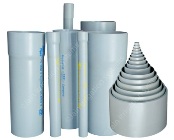.png)
The use of Polyethylene Pipes for conducting agricultural pesticides and fertilizers is popular. Unique properties of polyethylene pipe when compared with other types of pipes, the speed of growth of the use of this product in the conduction network of agricultural fertilizer and pesticides and distribution of water than other items are much higher. High strength and durable, low cost, easy to install, lightweight, corrosion resistance, hygienic, nontoxic, high diversity in sizes, durable against sun rays, are some of the most significant advantages which polyethylene pipes persuading farmers and responsible people for using Polyethylene Pipes.
About in every greenhouse and farms of the world, polyethylene pipes are being used in farms, Diverse connections for watering the gardens and farms are produced and marketed which is able for controlling the output level of water and as a result for controlling the amount of fertilizer and necessary pesticides for plants and also prevents these resources went away. Another aspect is the result which matters. And which is that a plant cannot be impregnated with a high amount of toxin and pesticides and therefore more healthy plants will be available for consumers. Agricultural Polyethylene Pipe has the ability for running the distribution and transmission of chemical fertilizers via the water flow and by which also for increasing the efficiency of fertilizer consumption. It also prevents the creation of unwanted moisture in farms and gardens and as a result of preventing breaking out some diseases like parasites and fungus at farms. Polyethylene Pipes and their connectors have a high variable in the size and working pressure. Hence according to the need and their necessary application-specific pipes will also be used.
Features & Specifications
- Manufactured from virgin pipe grade raw materials (PE80, PE100).
- Excellent corrosion and chemical resistance. Inert to most acidic and alkaline solutions.
- High flow characteristics.
- Light in Weight.
- Easy to handle & transport.
- Excellent flexibility combined with strength.
- Good abrasion resistance.
- Smooth inner walls minimises frictional losses.
- Safe for potable water supply.
- Manufactured as per IS-4984, ISO-4427, DIN8074, ASTM D 3035 and BS-6437 standards in PE-63, PE-80 and PE-100 grades.
- Manufactured from 20 to 2500 mm sizes at various pressure rating from 2.5 to 16 kg/cm² (35.5 to 227.5 psi).
- Upto 6" in straight lengths and coils. Higher sizes in standard and other straight lengths only.
Advantages of polyethylene pipe
- Deduction of related costs of flotation systems, installation, and irrigation management.
- Increasing the volume, speed, and pressure for cleaning water transmission for agricultural products in a completely controlled way.
- Reducing the loss of water and water leaks when compared with other systems of traditional piping.
- Increasing the efficiency of the equipment and employers with respect to the and easy up polyethylene.
- Minimizing risks of the distraction of water.
- Decreasing the costs of maintenance and reparation of the irrigation system.

